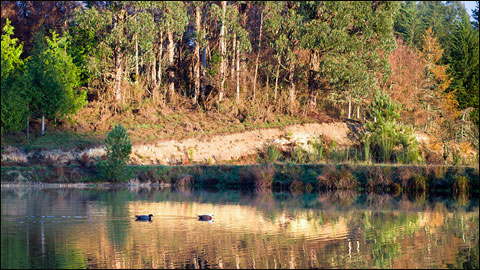Sluicing, Baiting, Wanton Waste and Other Duck Hunting No-nos
The boyfriend and I just got back from one of those hunting trips of a lifetime: We spent 11 days in New Zealand on an exchange program hunting lovely paradise shelducks, a beautiful shrieking rail called a pukeko, and alarmingly large black swans.
Adapting to hunting new species was easy. It’s hunting, baby! You figure it out pretty quickly.
Wanna know what was really weird? The laws.
Baiting waterfowl is, for the most part, legal in New Zealand.
Wanton waste (leaving a dead bird in the field) is not illegal. In fact, the term was not familiar to many of our hosts, though all shared our strongly held ethic to eat what we kill.
Lead shot is illegal, unless you shoot a sub-gauge. New Zealand is a small island nation – there are availability issues.
Shooting with an unplugged shotgun is legal in most regions, though magazine extension tubes are being phased out.
And sluicing – shooting at a bird that isn’t in flight, unless you’ve already wounded it – is illegal and carries a maximum fine of $5,000 (about $3,431 in U.S. dollars as of this writing).
When you dip into this world for 11 days, it really makes you examine your beliefs about hunting ethics and laws.
As a matter of principle, I have no problem with sluicing, provided the shot is safe and close enough to kill cleanly. The only real difference between shooting a bird that’s flaps down two feet over the decoys and shooting it when it has hit the water is that one shot will damage more meat. That bird is screwed either way, and cares not a bit which way it dies. And while I find a good wing shot eminently more satisfying, I care a lot more about making a clean kill.
Yeah, I’ve thought that one through quite a bit.
Then there’s baiting. Baiting some species – not migratory birds – is legal in parts of the U.S., but I find myself uncomfortable with it. I think it’s about trust. If you habitually bait, you are building trust with those animals, or you at the very least are overpowering their defensive instincts.
This is completely irrational. Decoys overpower ducks’ defensive instincts. Good calling overpowers them. Spinning wing decoys can make them utterly senseless. I use all three.
And not for nothing, there’s a lot of legal baiting of migratory birds in the United States. Safflower plots to attract doves, corn ponds to attract mallards – both are legal if you follow an arcane set of rules, and yes, I’ve hunted both.
We hunted baited water in New Zealand too, and I didn’t think twice about it until the last day.
We arrived at the conifer- and eucalyptus-lined farm pond after dawn to find a half dozen parries, or paradise shelducks, on the water. They are large and beautiful ducks that sound more like geese, the hens emitting a high squawk almost like a seagull’s, the drakes grunting in a peculiar, guttural way that Hank and I still imitate from time to time to make each other giggle.
Some of the parries at the far end of the pond immediately flew away, but two pairs remained on the water with us in plain sight as we set up. That’s a behavior we saw repeatedly on the trip, presumably because they know they’re safe on the water.
I sat at the edge of the pond where the bait was cast each night, and both pairs toodled my way, venturing into shooting range, pretty clearly trying to decide whether it was worth the risk coming near me to get the treats they knew were there.
At any of those moments, I could have erupted from my seat, startled them into flight and taken one or both of them, but I just couldn’t do it. In part, I find it a little silly to go through such machinations just to make a bird fly so I can feel better about the shot (or in this case, not pay a $5,000 fine – did I mention our host was a warden?).
It also just felt unfair, and wrong. This I know to be completely irrational. Killing isn’t fair. I have embraced this concept. I couldn’t be a hunter if I couldn’t accept it. But at that moment, it was a personal choice I made, and I didn’t regret it. I shot them with my camera instead.

A couple of parries.
Later on, a couple hen parries came flying over the little hill straight ahead of us, whiffling all the way in – doing that flippy thing that makes duck hunters’ hearts skip a beat. I stood, shot, and dropped one of them cleanly. I didn’t feel bad about it. Well, I didn’t feel worse about it than any other kill. I always feel sadness; I just didn’t feel I’d done anything wrong.
I think the takeaway from this is that we all hold beliefs about our hunting conduct that, when scrutinized, just aren’t rational. And we have laws that are, in aggregate, designed to protect the resource by limiting the number of animals we kill, though when taken singly, some appear to lack a rational basis.
I don’t begrudge other hunters – or even other nations – their own set of irrational rules. Whether I’m a guest in their country, or in their blind here in America, I’m happy to respect their rules, regardless of my beliefs. That’s just a matter of civility.
Holly A. Heyser is the editor of California Waterfowl Magazine. A hunter, forager, writer and photographer, she lives in Sacramento, California. You can see more of her work at hollyheyser.com

Holly A. Heyser is a hunter, forager, writer, food photographer and college journalism lecturer. She writes a blog about hunting at http://norcalcazadora.blogspot.com.and shoots food photos for boyfriend Hank Shaw, who writes a blog about wild food at http://honest-food.net.


Comments